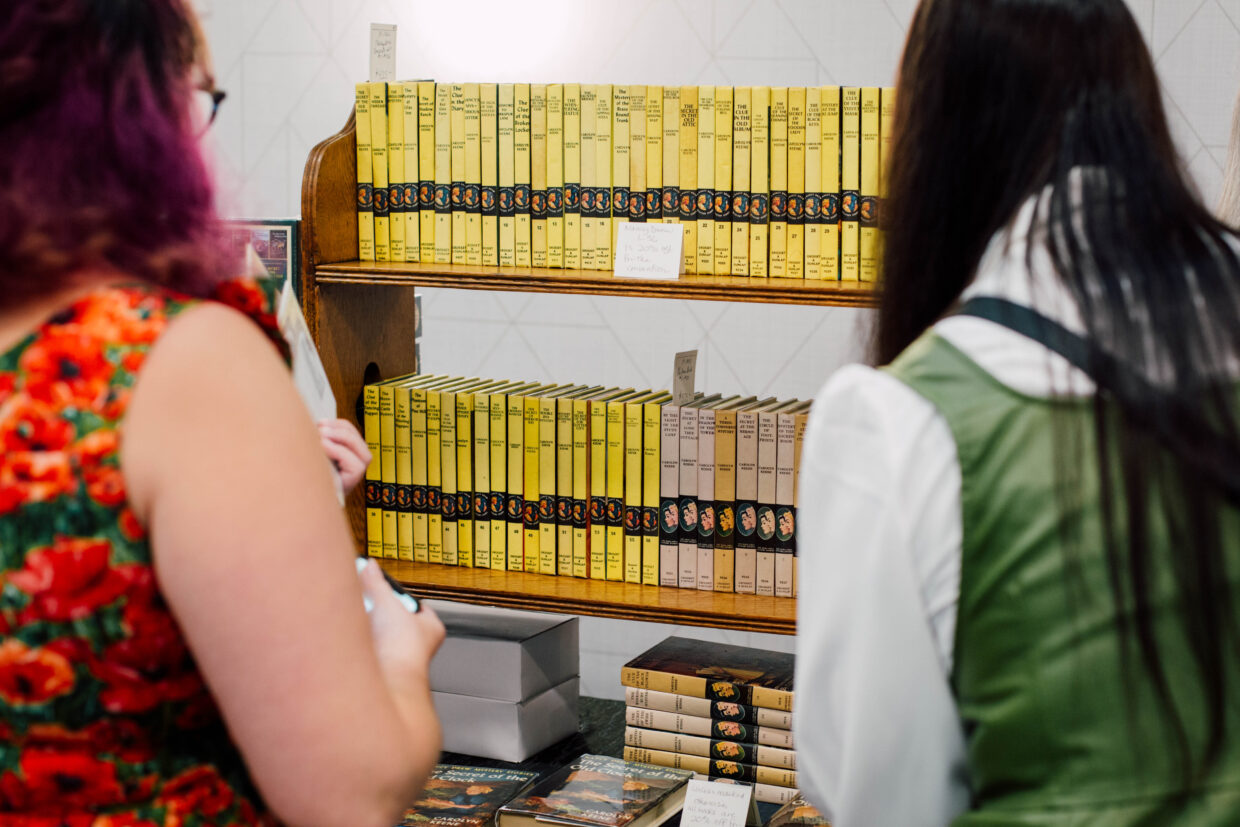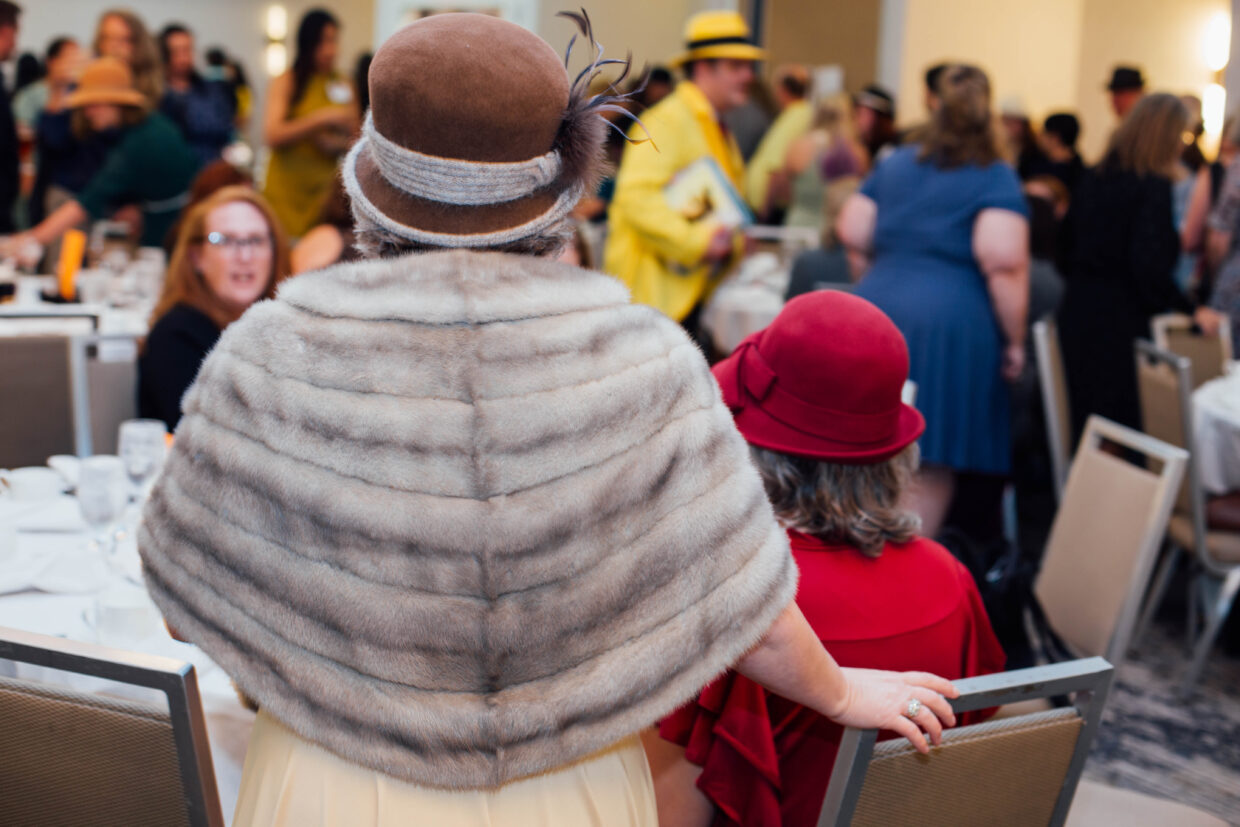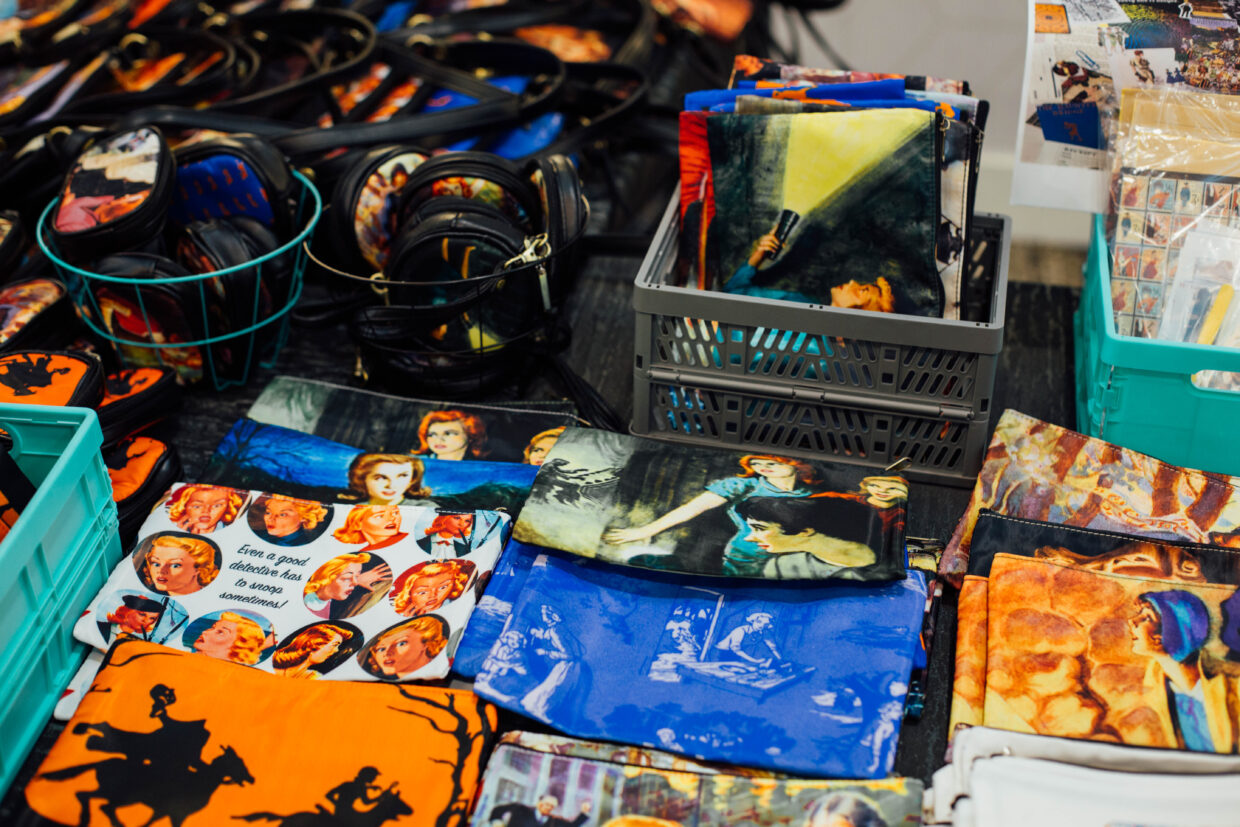It was late evening, in early October, in the place that wears it best: Sleepy Hollow, of Headless Horseman fame. Our tour group of twenty or so was gathered in the town’s colossal cemetery, watching as our guide shined a flashlight over the figure of a woman, draped across a marble mausoleum. “She isn’t meant to be anybody in particular,” the guide explained. “That’s a mistake people often make—thinking she’s someone specific.”
Article continues after advertisement
It was a mistake our group could understand. After all, we’d been brought out here by a very specific someone who also happens to have precious few discernible traits. This was the second night of the Nancy Drew Convention, an annual affair that sees devotees of the iconic teen detective (better known as “sleuths”) gather to celebrate her enduring legacy. Unlike the rest of the weekend’s activities, our cemetery tour wasn’t themed to Nancy—at least, not directly. Still, navigating poorly-lit trails between mossy gravestones, it was difficult not to feel a certain kinship with the girl detective. When we stopped before the final resting place of an actress who died under mysterious circumstances, our group of gumshoes pressed close, mirroring Nancy’s cheek-to-clue approach to case-cracking on the Russell H. Tandy covers of her early mysteries.
“What kind of gun killed her?” someone asked.
“Were her children hers or from her husband’s first marriage?”
“How could she be buried in this cemetery if her death was ruled a suicide?”
As in many of Nancy Drew’s adventures, the questions were more important than their answers. Does anyone really remember what the secret in the old attic actually was, once our favorite teen detective got it out of there? (“Sheet music!” someone answered during Saturday’s round of Nancy Drew trivia.) Though she’s closed 600-plus cases over the course of her 94 year career, Nancy’s always been more—and less—than her prodigious solve rate.

With a cultural half-life that spans five generations, two hair colors, and at least four mediums, the fictional detective became a mythic figure long ago. She’s also, fittingly, something of a mystery herself. Who is Nancy Drew, specifically? Why have fans been so long devoted to her, in particular? Though this year’s convention was centered on the 15th book in the original series, The Haunted Bridge, it’s this unanswered question that brought these two longtime fans to Sleepy Hollow. Surrounded by the decades-long devotion and keen expertise of those who know her best, we came in search of the girl who is forever finding things.
*
The Nancy Drew Convention officially began in Toledo, Ohio in 2001 and has descended upon a range of American cities on an almost-annual basis ever since. Activities vary year to year, but they tend to include trips to local haunts (like the graveyard), book hunting and collecting, presentations, merch sales, and—of course—a mystery to solve over dinner.
The convention’s shiniest selling point is also its most opaque: the website promises attendees the opportunity to “walk in Nancy Drew’s footsteps.” For many sleuths in Sleepy Hollow, that walk was closer to a pilgrimage, as several of the first-timers we spoke to had spent years patiently waiting for the con to reach their area; others had come from as far away as Austria. Depending on when a fan first encountered Nancy, the footstep-following can be a lifetime in the making.

“I grew up in a tiny town without television and a great library—Nancy Drew is what I read,” said Lynn Roper, 76, who attended the convention with her niece, Jennifer Gottschalk. The wide age ranges of con attendees surprised Roper, who expected a disproportionately older crowd. But for many sleuths, Nancy is a generational touchstone, and those slick yellow hardbacks are heirlooms. (Case in point: Gottschalk’s daughter is currently studying women’s history in high school. For her final paper, she plans to write about—who else?—Nancy Drew.)
“I think one of the biggest reasons she’s still around today is not just because the publishers keep her in print, but because moms and grandmas and families are passing these books down,” said Jennifer Fisher, the convention’s founder and the president of the Nancy Drew Sleuths fan club.
But the local library may not be the first place new generations of fans encounter the teen sleuth. Since Warner Bros. first adapted Nancy Drew to the big screen in 1938, the character has hardly been constrained to text. (She’s not even always a detective: in one film, Warner Bros. claimed she might be, God forbid, a journalist.) A franchise unto herself, Nancy can now be found in graphic novels, Emma Roberts movies, and CW shows. On the popular Nancy Drew Game Fans Facebook page—almost 10k users strong—fans of HerInteractive’s point-and-click adventure games ask for input on where to start playing with daughters or nieces. It’s not uncommon to come across an image of two heads tucked together in front of a laptop, tracking a minuscule magnifying glass across a darkened screen.

Next to the original books, the HerInteractive games are by far Nancy’s most popular manifestation. It’s not hard to see why: the games are thoughtfully written and beautifully rendered, offering a range of globe-spanning cases for amateur detectives to crack. More than that, they avoid the pitfall that has so often plagued other adaptations. In the games, fans play as Nancy, hence they never see Nancy. Vampirically, mirrors don’t reflect her; she’s always just out of focus in photographs. It’s an in-joke, yes, but also an ethos.
“How do you represent the Nancy Drew?” wondered Doc Wyatt, a devoted sleuth-slash-TV-writer-slash-toymaker who gave one of many talks at Saturday’s con. For him, the question was particularly pressing; Wyatt was in attendance to unveil the first-ever line of Nancy Drew action figures. Still, he was realistic about the probability of concretizing—or plasticizing, as action figures go—the detective’s essential essence. “How do you represent that iconic character? You don’t.”
Many have tried! For all her mythic qualities, Nancy Drew hardly sprouted fully formed, Athena-like, from a single head. Initially sketched by publishing titan Edward Strateymeyer as a young girls’ counterpart to his ever-popular Hardy Boys series, Nancy’s earliest iterations were the product of ongoing collaborations between Strateymeyer’s daughter, the editor Harriet Adams, publisher Grosset & Dunlap, and a host of ghost writers: collectively, the Carolyn Keenes. Mildred Wirt Benson is the best known among these, and most fans regard her as the series’ “original” author. But it’s difficult to trace back to an “original” anything when it comes to Nancy. For her first thirty volumes, published between 1930 and 1956, the sleuth is a 16 year old high school grad, blonde and beautiful. By book 35, she’s abruptly 18 and “titian-haired.” Wide-ranging revisions, beginning in 1959, rendered Nancy first more demure, then less chaste. She finally went off to college (in the On Campus titles), only to become a barely pubescent children’s book star some years later (in the still running Diaries). Always, the character lives in the fictional upscale suburb of River Heights. But in many ways, she’s nowhere to be found.
At the Westchester Marriott near Sleepy Hollow, however, Nancy was everywhere: in merchandise, in lovingly-crafted artwork, and in book covers from across almost a hundred years in the Drewniverse. It’s unsurprising, then, that much of the con’s programming focused on the challenge of depicting Nancy visually, defining her essence and defending it. As Ruth Sanderson, an illustrator responsible for 16 Nancy Drew covers beginning in 1979, explained during her talk, cover artists rarely receive a book’s manuscript in advance, relying on a one-sentence synopsis to bring the story to life.
In many of Sanderson’s Nancy Drew covers, the scene she chose to depict might not have appeared in the book, or might have unfolded differently: maybe a character was wearing a jacket instead of a poncho, or a climactic scene took place in a swamp instead of a forest. By Sanderson’s account, these were minor details. What really mattered to Simon & Schuster was that the redhead on that cover was recognizably Nancy Drew: preppy-chic, magnifying glass in hand and flashlight at the ready.
At least, that’s what mattered to them then. If you took a turn around the merch room at Nancy Con, you’d notice something strange: directly next to handpainted recreations of the original Nancy covers were covers depicting ’90s Nancy, a different beast entirely. This iteration of the girl sleuth came courtesy of artist Tricia Zimic, another presenter, who was hired by Simon & Schuster to “change Nancy Drew”—that is, to revamp her dated image for the Nancy Drew Files series.
To her credit, Zimic did just that, transforming Nancy into a Farrah Fawcett-like blonde goddess draped in the height of fashion (cutoff shorts, cropped tees, and puffer jackets, because the ’90s). But when Zimic did a news interview discussing the rebrand, she was honest about her mission, describing Nancy’s former style as “schleppy”; according to Zimic, the editors fired her shortly after. That was the end of the bottle-blonde wet dream, or at least Zimic’s version (press F to pay respects).
“There’s so much to not do with Nancy Drew, because she was such a particular person,” Zimic said during her presentation. But given the wide array of Nancy media, those particulars aren’t exactly well-defined. You know them when you see them—or rather, you know what you can fondly remember. “We grew up, and we’ve seen her in these books and on the covers—we know what she looks like,” Fisher said. “And that’s the Nancy people have in their head: whatever they grew up with.”
But hey, no worries: even if Nancy can’t be defined by her image, surely we can nail down a character logline. Sherlock Holmes is abrasive, Hercule Poirot is vain, Veronica Mars is prickly, and Nancy Drew is… the quintessential teen girl of her time, at all times. Yes, she was lovingly sculpted into being by Carolyn Keenes (Carolyns Keene?) and scores of illustrators, but she’s also one publishing executive’s idea of how an independent young woman might look and act, packaged for the masses and routed straight to a bookshelf near you—and your mom, and your mom’s mom. It’s true that most of Nancy’s iterations share a few traits: cute blue roadster, loyal boyfriend, indulgent dad. But these are things she possesses, privileges she has; there’s still frustratingly little to cement her as more than a concept.
That said, we were all in Sleepy Hollow to celebrate Nancy; there must be a reason, apart from her clothes or hair color or even her absolutely stacked resume. Determined to crack the case of her personhood once and for all, we asked con attendees how they’d describe the girl of the hour; many remarked on her intelligence, her self-sufficiency, and her purity of heart. “Nancy instilled that you don’t just let things happen, you see how you can help in that moment,” said Rachel Hatcher. “And then if it leads to a mystery, you get inquisitive.” Most sleuths we spoke to compared Nancy to the Hardy Boys, who often took a fee for their detective work—in certain iterations, they were straight-up working with federal agencies. Nancy’s cases, on the other hand, emerged organically from a desire to help people.
For Brian Centrone, this altruism was one part of her appeal. But to explain her longevity, the ethos of her character, he offered another word. “I think the one thing you could describe Nancy as is sort of modern,” he said. “I think that’s why she’s lasted so long and that’s why she’s influenced so many girls and boys, because she just invoked that spirit of, I could do anything.” The idea of Nancy Drew as modern makes a certain amount of sense: during the height of her popularity, women’s lives were a minefield of restrictions. Nancy was “unimpeded” in comparison, Centrone said—a trailblazer on the most literal level.
But almost a century later, most of those restrictions no longer exist; the trail is blazed, the road long since paved over. Hell, Nancy isn’t even the most modern version of herself anymore. Another one of the convention’s speakers, mystery author Nancy Lauzon, drew heavily from Nancy Drew in creating her own teen detectives and noted in her presentation that “[her] characters would like to be Nancy Drew, but they fall a little short.” Zimic echoed this sentiment, telling the crowd that if she were to modernize Nancy today, the look would have to change. Nancy wouldn’t be prim and proper, but she wouldn’t be Farrah Fawcett, either. “I want to see her tatted … I want to see her open,” Zimic said. “A young Nancy Drew should be empowered, but she’ll be a different person than she was in 1960.”
The argument that Nancy’s infallibility dates her is a valid one. And yet Centrone is right: Nancy Drew is modern. Sure, she may not be particularly progressive, or boundary-breaking, or remotely rooted in the 21st century; even recent adaptations ooze nostalgia. But “when you look at who’s reading these books, it’s the kids that are the target demographic,” Fisher said. “And for that age group, Nancy still transcends.” It’s why those of us who met her at a formative age can never quite shake her, why we carry her into adulthood like an imaginary friend—and why we pass her down so kids can imagine her differently.
She’s modern because when you’re young, the whole world is.
*
During our cemetery tour, we were primarily shown the graves of local legends: there was Washington Irving, of course, but also John D. Rockefeller, Andrew Carnegie, and Francis Pharcellus Church, journalist and editor for the New York Sun. Church is best known for receiving a letter from Virginia O’Hanlon in 1897; O’Hanlon, then eight years old, wanted to know if Santa Claus was real. Our tour guide read an excerpt from Church’s response (you know the one) and though we’d all heard it a hundred times, every line earned a chorus of awwws.

Near the end of our tour, the guide’s flashlight—which she assured us was strong enough to “land a plane”—began to flicker. She was in the middle of shaking it like a can of spray paint when Hatcher cleared her throat and asked to help. Hatcher would later tell us that she designs escape rooms for a living (neck and neck with “girl sleuth” for “world’s coolest job”), and her professional flashlight experience was on full display as she twisted the cover open, licked her thumbs, and rubbed the moisture into both ends of the batteries. Then she screwed the lid shut, and victory: the graveyard was once again bathed in aviation-caliber light.
Hatcher slipped back into the crowd, as if she hadn’t just embodied the plucky heroine of a dime-store mystery. We trudged to the next stop on the tour, as if we weren’t knocked-off-our-asses impressed. The path forward stayed lit, because of course it did.
Yes, Virginia, there is a Nancy Drew.
